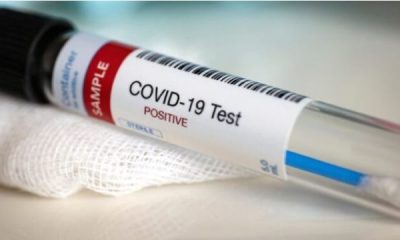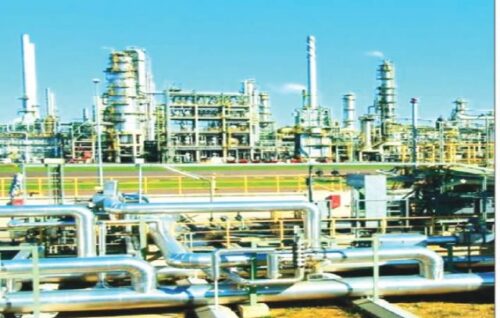The Federal Government announced on Monday that local refineries can now purchase crude oil in naira or dollars, indicating that it has finally given in to the demands of these businesses and other industry participants.
Additionally, it stated that as of January 1, 2024, Nigeria’s total reserves of crude oil and condensate had grown to 37.5 billion barrels, with a life index of 68.01 years.
During a briefing in Abuja, the government revealed this through the Nigerian Upstream Petroleum Regulatory Commission and announced the revised template for the domestic crude oil supply obligation.
It declared that, in a historic step, the NUPRC complied with the requirements of Section 109(2) of the Petroleum Industry Act 2021, had developed a template guiding the activities for Domestic Crude Oil Supply Obligation.
“The commission in conjunction with relevant stakeholders from NNPC Upstream Investment Management Services, representatives of Crude Oil/Condensate Producers, Crude Oil Refinery-Owners Association of Nigeria, and Dangote Petroleum Refinery came up with the template for the buy-in of all.
“This is in a bid to foster a seamless implementation of the DCSO and ensure consistent supply of crude oil to domestic refineries,” the Chief Executive, NUPRC, Gbenga Komolafe, told journalists in Abuja.
Responding to a question on the currency of transaction for crude oil purchase, as approved in the new template, Komolafe stated that it would be either in naira or dollar, adding that naira transactions would free the pressure on the country’s foreign exchange rate.
The NUPRC boss also pointed out that the template had become effective because all necessary parties had signed up for it.
He said, “The PIA intends to make the implementation (of crude oil obligation) very easy for the parties, both for the producers and refineries. So the answer simply is that the currency for the transaction would either be in naira or dollar. That is the simple answer.
“But we all know that if the transaction is carried out in naira, that itself will free the pressure on the exchange rate. That will help the exchange rate. So that is the intent and besides, the overall intent of the Petroleum Industry Act is to develop our midstream, which is a very laudable provision of the PIA.”
In the currency of payment section of the new template, it was stated that “the payment shall be in either United States dollar or naira or both. Where the payment is in both currencies, the payment split shall be as agreed in the SPA between the producer and the refiner.”
Earlier reports had it that modular refineries in Nigeria were facing the threat of shutting down operations following their inability to access foreign exchange for the purchase of crude oil, a commodity priced in United States dollars.
Nigeria has 25 licenced modular refineries with a combined capacity of producing 200,000 barrels of crude oil daily.
Although not all of the plants are currently operational, the report stated that the functional ones were increasingly finding it difficult to purchase crude due to the foreign exchange crisis in the country.
The facilities, which produce Automotive Gas Oil, popularly called diesel, Dual Purpose Kerosene or kerosene, naphtha and black oil, were finding it hard to make the refined products available to oil marketers for distribution to consumers.
Operators of the plants explained that the scarcity of dollars had made it almost impossible for dealers to purchase crude oil, as the modular refinery players and oil marketers demanded the sale of crude oil in naira from the Federal Government.
The modular refinery operators, who spoke under the aegis of the Crude Oil Refinery Owners Association of Nigeria, lamented at the time that the Federal Government had not been able to keep its part of the bargain concerning the provision of feedstock to local crude oil refiners.
The Publicity Secretary, Crude Oil Refinery Owners Association of Nigeria, Eche Idoko, had stated that modular refineries might close shop if nothing was done to ameliorate the situation.
CORAN is a registered association of modular and conventional refinery companies in Nigeria, while modular refineries are simplified refineries that require significantly less capital investment than traditional full-scale refineries.
Idoko said, “The purchase of crude oil in dollars is currently the major challenge to modular refineries. We buy crude in dollars and sell our refined products in naira, and this is a major challenge. And apart from that, where do you get the dollars to pay for the crude?
“You heard the Manufacturers Association of Nigeria crying out recently about the dollar saga. We have requested that crude oil be sold to us in naira. And when you do this, you ease the pressure on the naira and this will make our diesel cheaper.
“It will encourage more investors to build and patronise the local refineries. If you take petroleum products off the foreign exchange market, you would have helped the naira by 60 per cent.”
The government at the briefing on Monday, revealed that the total crude oil and condensate reserves in Nigeria increased to 37.5 billion barrels as of January 1, 2024, with a life index of 68.01 years.
It also announced an increase in the country’s gas reserves, as this moved up to 209.26 trillion cubic feet as of January 1, 2024, while its reserves index life was put at 97.99 years.
Komolafe said, “I am pleased to present to you an overview of the nation’s oil, condensate, associated gas, and non-associated gas reserves as of January 1, 2024, as follows: 1. Crude oil and condensate reserves stand at 31.56 billion barrels and 5.94 billion barrels respectively, amounting to a total of 37.50 billion barrels.
“2. Associated gas and non-associated gas reserves stand at 102.59 trillion cubic feet and 106.67TCF respectively, resulting in total gas reserves of 209.26TCF. The reserves life index is 68.01 years and 97.99 years for oil and gas respectively.”
Komolafe stated that positive gross additions to oil and gas reserves of 1.087 billion barrels and 2.573 trillion cubic feet respectively were recorded.
“Given the above, and in furtherance of the provisions of Chapter 1, Part III, Section 7 (g), (i), (j), (k), (m), (q), (r) (of the Petroleum Industry Act) and other powers enabling me in this respect, I declare the total oil and condensate reserves of 37.50 billion barrels and total gas reserves of 209.26 trillion cubic feet as the official national petroleum reserves position as of January 1, 2024,” he stated.
Before the latest increase announced by the government, Nigeria’s total crude oil and condensates reserves as of January 1, 2023, was 36.96 billion barrels, while its total associated gas and non-associated gas reserves as of January 1, 2023, was 208.83 trillion cubic feet.
Nigeria has been looking for new sources of oil by exploring what are called frontier basins. These are areas where little or no exploration has been done before.
Some of the basins being explored include the Anambra Basin, Benue trough
Bida basin, Chad basin (Nigerian section), Dahomey basin, Sokoto basin Deep and Ultra-deep offshore Niger Delta.
The Federal Government hopes that these basins will contain significant reserves of oil and gas. However, there have been some controversies about how much money should be spent on exploration, and how the benefits should be shared.
Notwithstanding the concerns, there is the potential that these basins could help to increase Nigeria’s oil production and boost its economy.
Meanwhile, while commenting on the significance of the reserves, Komolafe said the figures showed the abundance of crude oil and gas that the country could produce within a stipulated period, adding that Nigeria boasts 33 per cent of gas reserves in Africa.

 BIG STORY4 days ago
BIG STORY4 days ago
 BIG STORY23 hours ago
BIG STORY23 hours ago
 BIG STORY4 days ago
BIG STORY4 days ago
 BIG STORY4 days ago
BIG STORY4 days ago
 BIG STORY4 days ago
BIG STORY4 days ago
 BIG STORY1 day ago
BIG STORY1 day ago
 BIG STORY1 day ago
BIG STORY1 day ago
 BIG STORY3 days ago
BIG STORY3 days ago





































